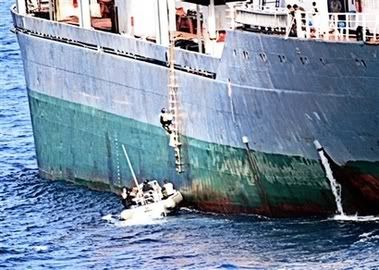
NAIROBI, Kenya - The U.S. military is once again tangling with pirates, intervening in waters off Somalia twice this week to help ships seized by hijackers — and bringing to mind another century's battles off Africa.
Pirates may have swapped muskets and the Jolly Roger for AK-47s and satellite phones, but the root causes of piracy are little-changed from when Thomas Jefferson contemplated how to handle attacks on American merchant ships two centuries ago.
"Instead of swinging from ropes, now it's boarding vessels with automatic weapons," said Cyrus Mody, a senior analyst at the International Maritime Bureau, which tracks pirate attacks.
The Barbary pirates of Jefferson's day took advantage of vast, unpatrolled African territory and leaders that encouraged criminality to prey on American merchant ships.
Writing in 1786, Jefferson urged using "ships and men to fight these pirates," and the U.S. military did just that, battling the Barbary pirates into submission in fighting off the shores of Tripoli.
Today, impoverished and weak governments in Africa have few resources to police on land, much less patrol territorial waters that can stretch a dozen or more miles into the ocean. The lack of security near major shipping lanes has created fertile ground for hijackers, and the U.S. Navy came to the aid of hijacked vessels from North Korea and Japan this week in the waters off Somalia.
"This is a very serious security problem on the African coast. These are not pirates who will remind you of Johnny Depp. These are quite different kinds of pirates," Assistant Secretary of State Christopher Hill told reporters Friday in Seoul, South Korea.
Noel Choong, head of the International Maritime Bureau's piracy reporting center in Kuala Lumpur, welcomed U.S. Navy action against pirates in African waters, which he says would otherwise be unpoliced.
"There is no law there. But if you allow foreign navies to patrol the area, it will be a major deterrent," Choong told The Associated Press.
The U.S. military intervention this week to help the North Korean tanker came after its crew members managed to overpower the hijackers and retake the vessel in a bloody fight. U.S. military personnel boarded the ship to help the wounded.
On Sunday, a U.S. destroyer destroyed two pirate skiffs lashed to a hijacked Japanese tanker carrying highly flammable benzene and 23 crew members. The Navy said Friday it continued to monitor the ship, which is still under the pirates' control.
The U.S. military says it doesn't intend to act as the sole police force on the open oceans, but says a long tradition demands rendering help to any ship that requests it, regardless of origin. Security on the high seas would mean less smuggling, piracy and terrorism, says Cmdr. Lydia Robertson, of the U.S. Fifth Fleet in Bahrain.

0 comments:
Post a Comment